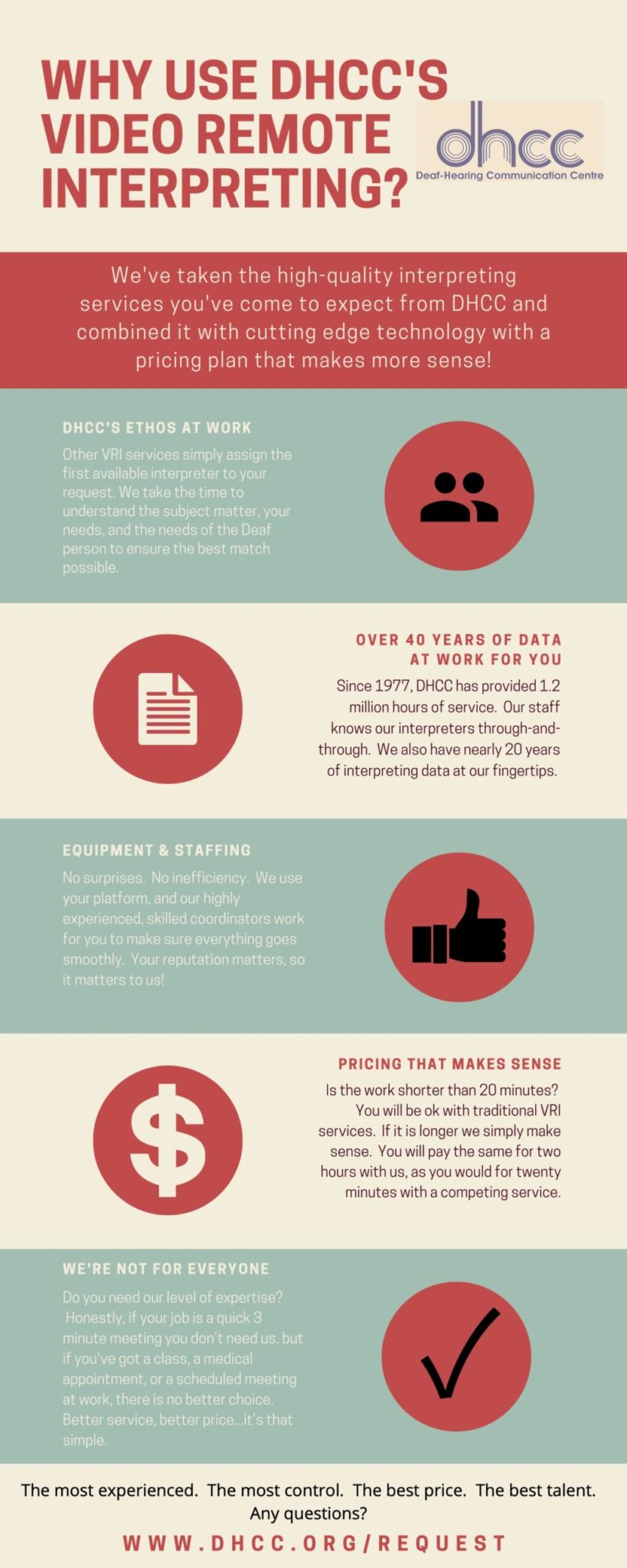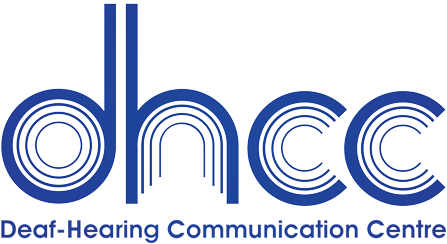Video Remote Interpreting
A new model in sign language interpretation.
Remote American Sign Language Interpreting
DHCC does not believe that communication access is well-served by having the next available ASL interpreter work for you. Rather, we take the request, review all of the particulars regarding the request then make sure that the interpreter that is assigned is experienced and skilled in the subject matter. These are our firmly-held values after nearly 45 years of interpreting service in the Delaware Valley region.
There are several potential benefits to utilizing a VRI interpreter:
- An interpreter can often be accessed with little advance notice. If a Deaf employee needs to attend a meeting that was called with with 2 hours notice, this is a great solution. Or if individuals are in quarantine and need medically-skilled ASL interpreters for consultations, this helps them feel more comfortable.
- Areas that have a high demand for interpreting services can tap into the skilled interpreters remotely. Instead of being told there is no interpreter available because all of the local interpreters are busy, the consumer can always be connected with an available interpreter.
- DHCC’s version of VRI can offer a substantial cost savings. Where other agencies may charge you per minute, you can realize the benefit of having highly skilled VRI interpreters stay with you for the duration of your meeting. DHCC’s pricing model means that you can have your dedicated interpreter available for your needs for 2 hours compared to the price of 25 minutes using traditional VRI pricing used by other agencies.
- No additional late minute request fees. If forgotten appointments or emergency situations are needed on short notice, additional fees will not be applied for VRI solutions that are requested within 2 business hours.
- No monthly service fees. DHCC does not charge monthly fees. There are no travel feels as well.
- Allows for easy compliance with disability laws. The ability to provide an interpreter, or provide an interpreter more quickly (while waiting for the in-person interpreter to arrive), allows organizations to more fully comply with applicable laws which require communication access.**
VRI is an excellent option for anyone who often needs short-notice access to interpreting services and/or is having trouble finding qualified interpreters to meet their need for interpreting services.
We provide interpreters for nearly every situation.

We work with over 150 American Sign Language interpreters who are among the most respected and qualified in the Philadelphia area. Our interpreters are able to cover nearly every need and circumstance.
Frequently Asked Questions
DHCC coordinates Video Remote Interpreting (VRI), which is the provision of sign language interpreting through the use of video conferencing technology where the parties that need to communicate are in the same location and the interpreter is connected remotely. High-end videoconferencing equipment is not necessary. In fact, the interpreter can be reached through any standard videophone or through a webcam on almost any computer. This technology allows the Deaf consumer needing interpretation to see the sign language interpreter clearly through the computer or videophone over the internet and vice versa. The interpreter would also be able to hear everything that is said on the opposite end to be able to effectively interpret through the videophone or computer’s microphone.
For more information about VRI including rates and/or to make a request, please contact the DHCC Interpreter Referral Department at: 610-604-0452
There are several potential benefits to utilizing a VRI interpreter:
- An interpreter can often be accessed with little or no advance notice. If a Deaf employee needs to attend a meeting that was called at the last minute, or a hospital needs to determine the immediate needs of a Deaf patient in the ER, an interpreter can be contacted on the spot and communication can take place without waiting for an interpreter to travel to the location.
- Areas that have a high demand for interpreting services can tap into the skilled interpreters remotely. Instead of being told there is no interpreter available because all of the local interpreters are busy, the consumer can always be connected with an available interpreter.
- VRI can offer a substantial cost savings. Instead of having to pay for a two or three hour minimum for short assignments, as well as mileage and parking expenses, the client only pays for the time used, with much shorter minimums, depending on the type of assignment and amount of advance notice.
- No additional late minute request fees – If forgotten appointments or emergency situations are needed on short notice, additional fees will not be applied for VRI.
- No monthly service fees – DHCC does not charge monthly fees. Charges are based on a 15-minute assignment fee plus any additional minutes used.
- Allows for easy compliance with disability laws. The ability to provide an interpreter, or provide an interpreter more quickly (while waiting for the in-person interpreter to arrive), allows organizations to more fully comply with applicable laws which require communication access.**
VRI is an excellent option for anyone who often needs last minute access to interpreting services and/or is having trouble finding qualified interpreters to meet their need for interpreting services.
** The Americans with Disabilities Act as amended (covers private businesses such as doctor’s offices, realtors, private employers, etc.), and the Rehabilitation Act of 1973 as amended (covers government entities and those receiving government funds) both require the provision of equal access to communication. It is important to strongly consider the preferences of the deaf person when determining what is necessary to provide equal access.
The following equipment and internet guidelines will ensure the appropriate video quality when accessing VRI services:
High-speed internet:
- DSL is usually not sufficient
- Ability to directly connect to internet is highly recommended (wireless connections are possible depending on the strength of the connection signal)
Up-to-date computer or laptop:
- For locations that will utilize the equipment in different areas, a cart is recommended for easy relocation of equipment
- Webcam embedded or plug-in (HD webcam highly recommended for the clearest picture quality)
- Optional: Headset (only necessary if one did not want to use the speakers/microphone on your laptop or computer for privacy concerns)
DHCC VRI – Software User Interface
To connect to an interpreter, simply go to joingotomeeting.com. Enter the meeting ID provided to you by coordination and click “Connect”. If prompted, click “Always”. Software will automatically download and you will be connected to the interpreter. Click on the camera icon to share your webcam so that the interpreter can see the consumer.
Should you have any difficulties, our coordinator will be happy to assist you in the process of connecting to the interpreter.
The first step is to have someone in your organization contact DHCC’s Interpreter Referral Department (IRD) at 610-604-0452, option 1 to become a customer. One of our coordinators would fax or email DHCC’s payment authorization form and rates and policies to review, complete and sign. The paperwork should be completed and returned before you make an interpreter request. Once DHCC has received the signed forms, you are signed on and ready to request an interpreter.
When a need for a sign language interpreter arises, call IRD at [610] 604-0452, option 1 as soon as the dates, times and locations are known. Our coordinators will begin looking for interpreters as soon as they have all the necessary information.
We ask that all customers submit their requests in writing. If the request is within the next 24 hours, please submit your request then call us at 610-604-0450, option 1 to confirm receipt.
If you’d like, we can fax you a request form to copy and use to fax or email your requests.
DHCC attempts to accommodate all requests, regardless of lead-time, even last minute requests. However, the following guide is helpful:
- For an appointment happening on only one day, we prefer at least one week notice.
- For an appointment happening on two days or more, we prefer at least two weeks notice.
- For large conventions or conferences, we prefer two months notice. It is also helpful if we can receive preparation materials for these – schedules, names of presenters, topics, abstracts, etc.
- For legal appointments, we prefer two weeks notice, as there is a limited pool of qualified, legal interpreters.
- Name of the Deaf individual
- Deaf individual’s main mode of communication – American Sign Language, Signed English, etc.
- Nature of the situation
- Exact location of the appointment including location name, street address, nearest cross street, building name, floor number and room number. If the location is difficult to find, please provide directions.
- Start and end time of the appointment. If security clearances or other preparations are necessary, be sure to include this when informing us of the start time.
- Name and phone number of a person who will be on site at the time of the appointment.
- Names of any other people involved in the appointment – doctor’s name, officer’s name, judge’s name etc.
- Any information available regarding the content of the appointment – schedules, agendas, order of events, copies of any presentations, etc.
- Requester’s name, phone number, fax number, and email address.
- Specific interpreter preference, if any.
- An emergency contact person and/or main number to the location so we have a specific person to contact in the event of an emergency such as a snow cancellation.
Once an assignment is confirmed, DHCC must pay our contracted interpreters unless they receive proper notice. Notice varies depending on the length of the assignment.
For assignments lasting up to two full days, requests for cancellation of services must be made with two (2) full business days notice in between the date of service and the date of cancellation or payment of contracted hours will be required.
For example: An assignment scheduled for Friday would need to be canceled by Tuesday in order for it to be non-billable. The 2 full business days would be Wednesday and Thursday. Weekends and DHCC office closures do not count as business days.
Use the following as your guide:
- You must cancel on or before WEDNESDAY to avoid charges for requests on or after MONDAY.
- You must cancel on or before THURSDAY to avoid charges for requests on or after TUESDAY.
- You must cancel on or before FRIDAY to avoid charges for requests on or after WEDNESDAY.
- You must cancel on or before MONDAY to avoid charges for requests on or after THURSDAY.
- You must cancel on or before TUESDAY to avoid charges for requests on or after FRIDAY.
*Note: The cancellation policy above does not include the cancellation expectations for longer assignments. Click here to view full cancellation policy.
Medical or police personnel that need a sign language interpreter for a Deaf or hard of hearing person with an emergency should call DHCC at 610-604-0452 immediately. You will be asked if your hospital or police or legal department is a DHCC customer. If you are not sure or you are not a customer, the coordinator will ask to speak with someone in authority to authorize the service and guarantee payment.
A Deaf or hard of hearing person should ask the hospital or police personnel to call DHCC to request an interpreter.
If you have an emergency during non-business hours, call 610-604-0452. Listen to the message and follow the prompt to push 1 for the Emergency Service Mailbox. You will be asked to leave your first and last names, phone number and extension, location calling from and a short description of the emergency. This information will be forwarded to the EIS Coordinator, who will call you back and get the rest of the information regarding your situation and dispatch interpreters to your location.
One Coordinator and four interpreters (two hearing and two Deaf) are on-call every evening, weekend and holiday. This way, we are prepared for multiple emergencies. A Deaf/hearing team – one interpreter who is Deaf and one interpreter who is hearing – ensures that we are prepared for any level of communication.
Police and medical emergencies can have life-altering consequences. Therefore, a Deaf/hearing team of interpreters is usually required to ensure accurate, effective communication. This team approach has proven to be the most effective way to handle police and medical emergencies especially when the communication skills of the Deaf person are unknown
In most cases, interpreters can be at your location within 60 minutes. However, depending on our location and demand for service, arrival time may be up to one and a half hours. Our coordinator will advise you of the expected arrival time.
As part of our Education and Outreach program, DHCC offers special training for police and emergency service personnel to help them become more aware about the best ways to provide communication access to Deaf and hard of hearing people in an emergency or a planned appointment. We would be glad to work with you to tailor a program to your particular needs. Click here to find our more about our sensitivity trainings.



